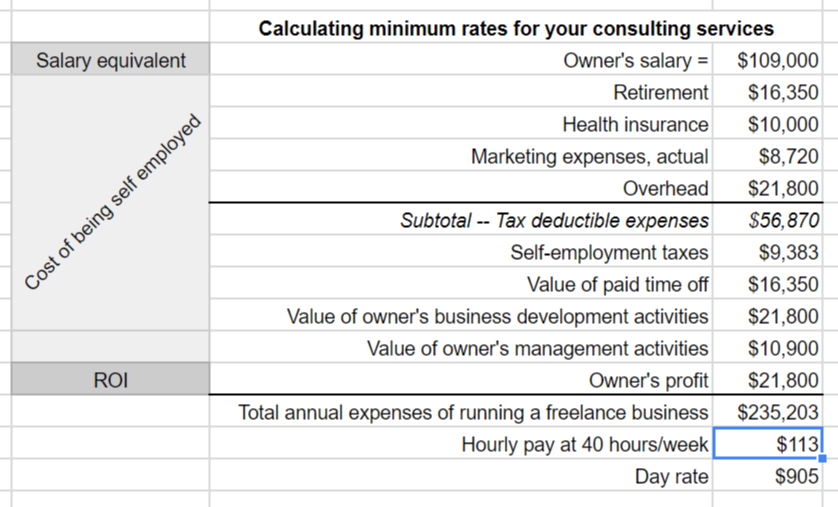
Select Page

Contents
The term management consultant covers many variations across diverse specializations and industries. The term is also applied to professionals who provide a scope of services that aren’t easily defined. This makes it more difficult to describe a management consultant, the salary and the prospects than other roles in our career guide series.
Also, many people reserve the term “consultant” for employees in a consulting firm, and they specify “independent consultant” for professionals who provide these services on an independent contractor basis. Nation1099 will use consultant and independent consultant interchangeably to refer to 1099 professionals.
The Bureau of Labor Statistics calls these professionals management analysts rather than management consultants, but that may include a broader group than the highly-skilled planners and advisors described here. The BLS comes up with an average salary significantly lower than some of our other data sources.
The BLS job growth forecast is 14 percent, double the average growth rate for all occupations, with more than 115,000 new jobs in this role expected between 2016 and 2026.
The BLS estimates that 17 percent of management consultants are “self-employed.” Assuming that includes people working both full-time and part-time on an independent contractor basiss, it’s roughly in line with our estimate for the workforce at large that 11 percent of all U.S. workers are full-time freelance and another 3-4 percent are primarily freelance and working part time.
Most salaried jobs in this area are with big consulting firms, and much of the growth in the freelancing are these “supertemps” who are refugees from those consulting firms seeking a better work-life balance. MBO Partners finds that the fastest growing segment of the freelance workforce is the highest earning segment, many of them working as independent management consultants.
Pay for independent management consultants is highly dependent on the scope of services provided and the specialization. For example, jobs described as business consultant or business analyst may make about 25 percent less than the figures summarized below.
A management consultant encourages business process improvements within a company. They gnerally:
At Nation1099, we define consulting as strategy, planning, advisory and project management services, and we refer to freelancing as services to create particular content such as software, marketing materials or other media.
Therefore, an independent management consultant provides strategy, planning, advice and project management about a business process so that the client company can manage its resources better.
Experienced consultants will already know this work depends on excellence in a broad range of mathematics and communication skills, including presenting and collaborating effectively. According to Payscale, the following fundamental skills don’t improve earnings for an independent management consultant:
The skills that have the biggest impact on earnings, according to Payscale, include:
To succeed as an independent management consultant, you need to be able to:
An independent management consultant can specialize in a particular kind of business problem such as:
Consulting services are often in demand from clients who want advice on coping with emerging technologies or structural changes in marketplaces. Some niche specializations that have emerged for independent management consultants recently include:
A management consultant can also specialize in a particular industry such as retail, healthcare, manufacturing or government.
To advance your career as a freelance management consultant, you should consider the details below on IT project management.
(Nation1099 is an affiliate of some of the companies mentioned below and may receive a commission if you purchase from them.)
Your minimum rate as a independent management consultant should be at least $113 on an hourly basis if you live in the U.S. and have 7-10 years of experience. Your minimum daily rate should be $905. (See a big caveat below about travel and other expenses not included in this rate.)
We took management consultant salary data for full-time employees in the U.S. from several sources such as Glassdoor, ZipRecruiter, PayScale, LinkedIn, Indeed and the Bureau of Labor Statistics and applied our “all-in expense formula.”

This formula shows the costs to you of having an independent consulting business rather than a job with a company or a consulting firm. The formula ensures that your rates include the costs of retirement benefits, health insurance, marketing expenses and other overhead, along with the value of unpaid work in your solo business.
This article explains in detail our formula for setting consulting rates.
You can use our consulting rate calculator to adjust the variables if you have more or less experience as a management consultant or different expenszes.
1.Expand into project management
For salaried employees, the most common next role for a management consultant is in IT project management. Others may become project managers in other domains.
An independent management consultant should likewise consider how their services develop to encompass project management in IT or in another domain.
2. Build a team
Related to that, for an independent management consultant the path to higher fees may include assembling teams of specialized consultants for complex projects. Be sure to check out our guides on working effectively with subcontractors. One of the key concepts is that it is possible to have the upside of remaining an independent consultant but also be able to deploy a team quickly like a consulting firm when needed.
Related reading: 4 Steps To A Clearer Freelance Brand
Look to the specialized job boards. Gig economy job boards have come to the specialized world of high-value independent consulting work.
These consulting job sites emphasize very high-skill jobs relative to more familiar job boards like Upwork. They are often quite exclusive both of the consultants who may access the site and of the companies that can post jobs.
Consultants are notorious for not sharing their business development techniques compared to businesses in other fields or industries. In fact, part of the inspiration for Nation1099 was the observation that it was easier to find information on marketing a food truck business than a professional services business.
So this section will be comparatively thin for now. Please share any resources you know of, and we’ll be glad to add them. Also, see the section on consulting podcasts below.
One place that is serving independent consultants, including supporting business development, is Consulting Quest. We’ve talked to them a little and are eager to learn more the services they are developing.
You should also look at what MBO Parners has to offer via MBO Connect.
One excellent source of information about running an independent consultant business, including marketing, is the book Million Dollar Consulting by Alan Weiss. He popularized the value-based pricing concept and comes up frequently in our interviews with consulting experts such as Dorie Clark.
Of course, there is a lot of obvious advice out there on familiar tactics. A lot of it boils down to having a strong thought leadership agenda and then promoting that through:
Nation1099 also publishes articles on growing your consulting business. Here are some of our most in-depth and actionable pieces:
You can find many courses online to help you acquire the basic skills required of a management consultant. Some of the deepest catalogs are on Skillshare and Udemy, and Udemy lets you sort by experience level.
Both of those catalogs have plenty of courses on project management. Courses on IT project management in particular or in a particular domain is tougher.
One available on Udemy you should consider is IT Project Management For Beginners: A Step-by-Step Guide.
Pluralsight generally has good courses in technical skills, so if you want to get command of a particular technology as you grow into IT project management, check their technology index. Their course on Building an IT Strategic Plan looks promising for people wanting to develop their management consultant services.
For the leadership, communication, project management and business fundamentals skills discussed above that will help you sell more consultative services, EdX and Coursera are a great place to start:
You should also check those catalogs for courses in other emerging niches. For example, if you particularly want to specialize in consulting in IT for healthcare, this course at Coursera will be valuable.
As we discussed above, professionals in this field don’t have a long history of sharing or of publishing operational advice about running and growing their businesses. We haven’t found many great business resources uniquely for experienced professionals in this area.
That tradition is starting to change though, and, in many cases, the best inspiration and advice seems to be coming from podcasts:
Of course, growing your consulting business depends on growing your perspective and your information base. There are hundreds of great podcasts for that. A few favorites:
Finally, the library of past webinars at MBO Partners is a gold mine of business advice.